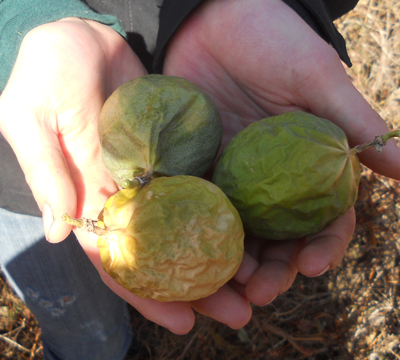Passion Fruit Benefits
Passion fruit benefits. Is this surprisingly good vine growing in the wild in your backyard? Once a tropical fruit, the passion fruit plant is now growing in the wild in many parts of the United States and can provide a delicious treat for you and your chickens as well. Here is some helpful information as well as some of the benefits of passion fruit.

The Passion Fruit Vine
Passion fruit is a shallow-rooted woody perennial vine that can be found climbing on fenceposts and anything else it can wrap its tendrils around.
It produces a single flower that can be used to make a fragrant passion fruit tea.
In addition, it produces a round, slightly shriveled fruit with a tough rind ranging in color from light yellow or pumpkin to dark purple.

They are also sometimes called may-pops (they may pop when you step on them).
Open the fruit and inside are sweet-smelling membranous sacs filled with pulpy seeds and juice that can been eaten raw (seeds and all) or used to make delicious sauces, ice cream, pies or even cocktails. I recently had a tasty drink made with passion fruit, cream and ginger ale.
But please remember the wildcrafting rule when it comes to food found in the wild. Only harvest approximately 25 percent of whatever wild food you find so that it can reseed itself and grow more the following year. That way, you will be able to enjoy passion fruit for years to come.
Passion Fruit Benefits
Passion fruit is loaded with vitamins C and A (one cup of passion fruit provides 25 percent of your recommended daily requirement of vitamin A), as well as containing potassium and iron. Passion fruit seeds provide much-needed fiber.
Passion fruit also has antioxidants that protect you from damaging free radicals and premature aging. Eating the fruit can help you relax and is good for easing anxiety and high blood pressure.
How to Use Passion Fruit
Cut the fruit in half lengthwise then use a spoon to scoop out the pulp, seeds and all. Place about half a cup of the pulp in a saucepan, along with a cup of water and a cup of sugar. Bring it to a boil, stirring until the sugar is all dissolved.
Then reduce the heat and cook for about fifteen more minutes. You can use this syrup to sweeten tea, add to cocktails or as a topping on your ice cream.
Is Your Passion Fruit Wormy?
If your passion is wormy or damaged, pop it open and feed it to your chickens. The worms have a lot of proteins your flock needs.
Related article: How to turn your hickory nuts into syrup.
Learn More About Self Reliance










New! Comments
Have your say about what you just read! Leave me a comment in the box below.